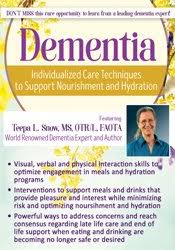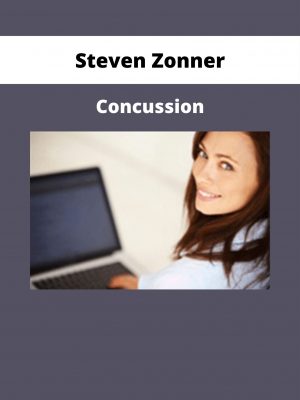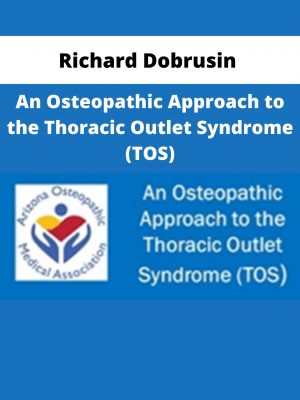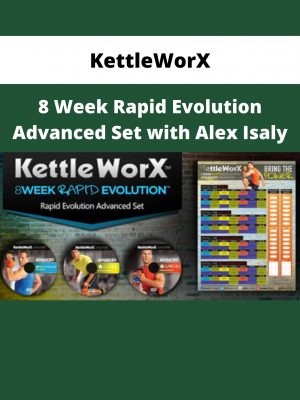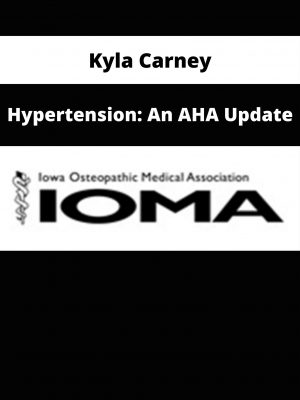Teepa L. Snow – Dementia
$219 Original price was: $219.$62Current price is: $62.
Shopping Instructions:
- DISCOUNT 15% : SHOP15
- Product Delivery: Within 1 – 12 hours after purchase.
Drawing on over 30 years of clinical experience and research with dementia, Teepa will teach you practical and useful strategies and techniques to maximize functional performance, engagement and safety.
Teepa L. Snow – Dementia
- Dementia’s Effect on Appetite, Nutrition, Hydration, Meal Preparation and Eating
- Our relationship with food, drink, meal preparation and eating from multiple aspects:
- Cultural
- Spiritual
- Social
- Emotional
- Individual
- Physical
- Sensory
- Physiological
- Value and meaning of food and drink that affect behaviors related to food and intake
- Assessment tools to personalize behavioral interventions
- Our relationship with food, drink, meal preparation and eating from multiple aspects:
- Impact of Dementia on Changes in Brain Function
- Screen for visual, auditory, sensory-motor, olfactory and gustatory sensory intake
- Processing changes at various stages of dementia
- Cognitive skill alterations that affect independence, interest and engagement:
- Time awareness
- Situational awareness
- Problem solving
- Sequencing
- Memory
- Language processing
- Impulse control
- Ability-based and Cognitive Disability Evaluation Tool – GEMS® Model
- Provides common language and a framework to modify expectations and environments for:
- Early Stage (Diamond)
- Moderate Stage (Emerald)
- Moderately Severe Stage (Amber)
- Severe Stage (Rubies)
- Extreme Stage (Pearls)
- Provides common language and a framework to modify expectations and environments for:
- Techniques to Develop Skills that Optimize Successful Nourishment and Hydration
- Structured initiating to promote active participation and limit refusals
- Verbal statements to promote choice, self-direction and task initiation
- Cueing sequences with graded options for each GEMS® state
- Support attempts, focus attention, automatic reactions and reflexes
- Minimize distractions and passive feeding behaviors
- Strategies to Enhance Nourishment and Hydration in Early to Late Stage
- Guide meal selection, settings and routines in combination with each GEMS® state
- Limit refusals, negative reactions, over or under eating or drinking
- Cues, routines, communication and interaction skills to optimize performance
- Social, physical, and sensory environmental features that foster or impair optimal function
- Environmental settings/situations to address probable areas of concern
- Create individualized care programs to provide optimal support for you
- Members of a support team: The role of each person/discipline
- Life is Ending: The Role of Food and Drink
- Physical, behavioral, and physiological changes that typically signal the ending of life
- Interaction skills that support the exploration of:
- Personal beliefs about life sustaining measures
- Personal choice
- Offer versus push
- Value and meaning of food and drink
- Eating by mouth versus artificial hydration and nourishment
- Offering techniques that differentiate between lack of ability to make use of the nourishment and hydration vs. inability to understand the offer of food or drink
- Techniques and strategies when nourishment and hydration is no longer the goal
Would you like to receive Teepa L. Snow – Dementia ?
Description:
Watch world renowned dementia expert and author, Teepa L. Snow, MS, OTR/L, FAOTA, for this engaging workshop as you explore the depth and breadth of change that various forms of dementia have on the person’s interest in and ability to consume food and drink—for enjoyment and survival. During this highly interactive program, you will learn the skills necessary to design and implement programs that serve your client to optimize remaining abilities and capacities while respecting and acknowledging the limitations that this neurodegenerative condition ultimately has on the person.
Drawing on over 30 years of clinical experience and research with dementia, Teepa will teach you practical and useful strategies and techniques to maximize functional performance, engagement and safety. You will walk away with screening and assessment maneuvers, environmental and programming modifications, ability-based cueing and assistance from first symptoms to end of the life considerations, and will be able to make a positive and valuable difference in the lives of people living with dementia whether—
- guiding in food and drink preparation during early stage situations
- fostering item selection and supported intake in mid-stages
- offering moisture and tastes for sensory satisfaction only at life’s end.
Course Features
-
Lectures
0 -
Quizzes
0 -
Duration
Lifetime access -
Skill level
All levels -
Language
English -
Students
242 -
Assessments
Yes
Related products
HEALTH & MEDICAL
HEALTH & MEDICAL
HEALTH & MEDICAL
HEALTH & MEDICAL
KettleWorX – 8 Week Rapid Evolution Advanced Set with Alex Isaly
HEALTH & MEDICAL
HEALTH & MEDICAL
HEALTH & MEDICAL
Gaia—Creating-High-Voltage-Health-with-Glenn-Streeter-Open-Minds



